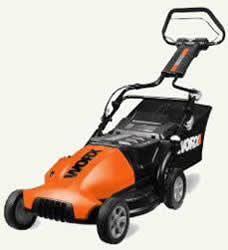Now that spring is here, it's time to drag out the lawn mower for another season. If you're tired of that noisy and smelly gas-powered mower, then maybe it's time you discovered cordless, battery-powered lawn mowers (Figure 1). Clean, quiet and easy to start, they require no gas, oil changes or spark plugs. The battery takes the extension cord out of the mower equation, and starting is gentler on your back than yanking a starter cord.

Figure 1 - Cordless electric lawn mower
Cordless, battery-powered mowers vary in sizes and performance.
No Noise:
Electric mowers are much easier on your ears compared to their gas counterparts. The average electric mower makes no more noise than a washing machine (about 75 decibels), while a gas-powered lawn mower can make as much noise as a motorcycle (about 95 decibels). Noise pollution is a real problem with gas mowers, as any late sleeper on a Saturday morning knows. But they can be more than a nuisance for those who use them.
Loud noise can contribute to hearing loss when it exceeds 85 decibels, according to the National Institute for Occupational Safety and Health. A gas-powered mower producing 95 decibels should be used no more than an hour a day, according to the Occupational Safety and Health Administration. Switching to an electric mower will ease the stress on your ears and your neighbors.
Environmental Benefits:
Besides giving your eardrums a break, battery-powered mowers offer a compelling environmental benefit - they pollute much less than gas-powered mowers. Gas lawn mower manufacturers are designing more efficient engines to comply with the Environmental Protection Agency's (EPA) new emission standards for lawn-and-garden equipment, but many lawn mowers predate these new standards.
Even new gas mowers that meet the EPA standards still spew a higher percentage of VOCs (volatile organic compounds) into the air than automobiles. According to a 2003 EPA report, lawn-and-garden equipment accounts for 5 percent of all ozone-forming emissions. The same report concludes that one hour of lawn mower usage produces as much air pollution as driving a car 20 miles.
Emissions and spills from gas containers and tanks also contribute to soil and air pollution. According to the California Air Resources Board, portable gas containers account for about 87 tons per day of smog-forming reactive organic gasses in California alone, which are equal to the heat-trapping emissions from about 1 million cars.
California already has standards governing the containers that release these emissions, but they remain unregulated at the federal level.
